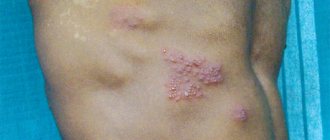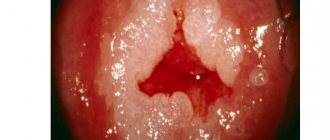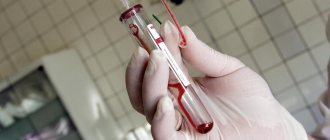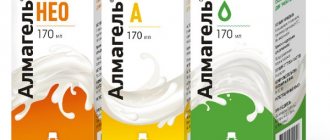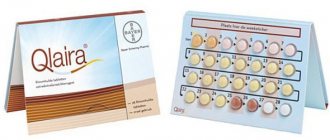Colds on the lips scare people little, but genital herpes makes many people nervous, despite the fact that it is caused by the same virus - Herpes simplex or HSV (herpes simplex virus). In this article we will look at how this virus manifests itself in the genital area in men and women, what is the incubation period of the virus, how long does it take to manifest in certain forms, and what it can be confused with.
Features of the disease
Contents
The latest statistics are very disappointing: 60% of the adult population of the planet carries genital herpes - a virus that is impossible to get rid of. In most cases, a person does not feel the disease; it is asymptomatic. Where does intimate infection come from, what are the characteristics of the disease? Experts, after lengthy research, point to the factor of sexual liberation that arose after the sexual revolution of the seventies of the last century. In European countries, the USA, Canada, Central and South America, not only genital, but also anal and oral sex began to be practiced, accelerating the process of infection of people.
Risks of getting herpes
Every person always suffers from herpes to a certain extent - this virus is a priori present inside the body and is just waiting for the right time to manifest itself clearly. However, some people are becoming particularly familiar with the virus. So, most often homosexuals, people with black skin color, women and people with other types of sexually transmitted diseases appear in pictures of genital herpes.
How is genital herpes transmitted?
Most often, HS is a problem among young people between 20 and 30 years old. At this age, a person often changes sexual partners, has poor protection, or treats sexual matters frivolously.
It is a big mistake to believe that the virus penetrates only through kisses or close contact with persons who have characteristic rashes on their bodies.
Do not forget about congenital or acquired viral disease due to immunodeficiency, leading to infection with the second type of genital infection.
Genital herpes is transmitted by three methods of sexual contact:
- Through the mouth (oral).
- Vagina (vaginal).
- Anus (anal).
And also through:
- contact with the skin of a sick person;
- using hygiene items from an infected person;
- self-infection - the disease spreads from an infected area to an uninfected area.
Important: airborne - the virus can survive outside the human body for up to 3 days. The infection dies only at temperatures above 50 degrees.
Infection occurs from mother to baby during childbirth.
Pathogens
Genital herpes is embedded in the cell's DNA structure, its main symptom is the virus affecting the human genital organs. Several subspecies are known that can cause serious damage to the skin, internal organs, and nervous system. These include:
- Epstein-Barr;
- simple virus types 1 and 2;
- chicken pox;
- cytomegalovirus.
HSV provokes diseases in the oral and genital area:
- It is the cause of painful and wet blisters on the chin, lips, wings of the nose, etc.
- The culprit of the formation of the same types of lesions in the genital area. Often this subspecies is detected with a “bouquet” - cytomegalovirus and ureaplasma.
Virus carriers
After being infected through sexual contact with type 2 virus, about 90% of those infected do not experience any symptoms.
For this reason, many are carriers of a dangerous disease and are capable of infecting their partner through close contact. Antibodies are detected in the blood of students - 9%, college students - 4%, average representatives of society - 25%, patients of skin and venereal disease clinics with a traditional orientation - 26%, lesbians and homosexuals - 46%, prostitutes - up to 80%.
Interesting fact: most antibodies to the disease are detected in people of the Negroid race.
If genital herpes manifests itself, the first symptoms are felt with a drop in immunity, severe chronic diseases, hypothermia, overheating, etc.
At-risk groups
In addition to sexual contact, risk factors for infection include the following:
- psychological, emotional trauma;
- menstruation;
- long exposure to the sun, overheating, hypothermia;
- colds, flu, ARVI;
- overwork;
- surgical operations;
- anesthesia;
- chronic, infectious diseases;
- cosmetological manipulations, physiotherapy;
- alcohol abuse, smoking, etc.
Once in the human body, the infection is introduced into the DNA of the cell. From this moment on, the microorganism begins to control processes in the body through reproduction. The work of the DNA structure is simply blocked, after a day the infected cells die, and the infection continues to infect others. The infection does not manifest itself for a long time and as soon as favorable conditions arise, an exacerbation occurs.
Incubation period of genital herpes
If the period of reproduction and incubation has ended, the person becomes dangerous to healthy partners. In the absence of obvious signs, he neglects important rules of protection against infection. The incubation period ranges from several days to one month. It is quite difficult to determine the disease in carriers without external manifestations; detailed diagnostics and analysis are required.
Diagnostics
Diagnosis of genital herpes most often goes through two stages:
- Visual inspection. During an external examination, all symptoms of the rash, the general well-being of the patient and an objective examination of the patient’s medical history are taken into account. This is done by a venereologist, and it is worth taking into account all possible symptoms that were present before the patient came to the clinic. Therefore, you should not hide anything from your doctor. And if the rashes last a long time, they need to be differentiated from syphilitic ones.
- Laboratory diagnostics. The first method is to grow the virus in tissue culture, which requires taking biomaterials for analysis. Cells from the affected area are collected from the uterus, vagina or urethra. After growing, the cells are studied. The second method is ELISA to detect antibodies to the herpes simplex virus. This test can detect the virus even if the patient has no symptoms.
Symptoms of genital herpes
According to the clinic, genital herpes, as in the photo, can be primary and recurrent. In the first case, we mean the first episode, in the second, subsequent cases of the appearance of obvious signs.
Symptoms in men
The primary subtype occurs in infected young men after the start of sexual activity. It is characterized by the following symptoms:
- rise in temperature;
- headache;
- general malaise;
- myalgia;
- sciatic nerve neuralgia;
- dysuria;
- burning and itching;
- discharge from the urethra.
With this type, the lymph nodes in the groin area often become inflamed and swollen
Symptoms of RGG - recurrent:
- The appearance of painful blisters.
- The affected area is large and includes the foreskin and glans, skin of the penis, and scrotum.
- In rare cases, rashes can be localized on the inner thighs and buttocks.
- Severe swelling of the mucous membrane of the genital organ.
- Hyperemia.
After one to three days, the blisters open, large foci of wet erosion are formed, as in the photo attached to the article. As a result, one large ulcer with shallow ulcers merges.
Consequences of genital herpes
First of all, GG affects the reproductive functions of men.
Herpetic urethroprostatitis is considered dangerous; cystitis and proctitis are less common. During an exacerbation of the listed diseases, obvious signs of GG appear on the skin and disappear only after the disease subsides.
Dangerous consequences arise if the disease recurs more than 6 times a year and antiviral therapy is not undertaken. Due to the presence of rashes and lesions in the genital area, patients feel like outcasts, have complexes, and develop mental disorders. Intimate herpes is a provocateur of serious illnesses - oncology, inflammation of the prostate gland, etc.
Symptoms of the virus in women
In the primary type, infected women exhibit the following symptoms:
- hyperemia, swelling of the genital organ;
- fever, rise in temperature;
- burning, redness of the mucous membrane;
- fatigue, malaise, weakness;
- rash on the skin in the form of blisters.
After one to three days, the blisters burst, and the area becomes covered with wet erosion, causing severe pain.
A sexually transmitted infection affects the external part of the genital organ, perineum, urethra, anus, and inner thighs.
Recurrent occurs in 50% of people who have undergone primary HS. There is a typical and atypical form of the disease, and RGG is also characterized by an asymptomatic course.
Depending on the frequency of exacerbations, doctors identify several more forms of RGG:
- light – repeat up to 3 times a year;
- average – up to 6 times a year;
- severe - exacerbation every month.
Recurrence of a genital infection can be caused by various factors, including hypothermia, overheating, stress, etc.
The atypical form is observed in an erased form and accompanies chronic, inflammatory processes of the reproductive system. Her symptoms:
- the appearance of small bubbles;
- copious discharge;
- presence of erythema zones;
- pain, burning and itching in the genitals and during urination;
- swelling.
If the disease lasts for a long time, enlargement of the lymph nodes in the groin area is possible.
Genital herpes and pregnancy
Infection during pregnancy can lead to dangerous consequences. A child in the womb can become infected in 50% of cases. Infection can also occur during childbirth, when the baby passes through the birth canal of an ill woman. Cases of infection during caesarean section cannot be ruled out. Consequences:
- 35% – severe damage to the nervous system;
- 45% – damage to the skin and eyes.
Other dangers are also possible, including herpetic encephalitis, which leads to disability or death.
The general statistics of transmission of infection to a baby from an infected mother is up to 5%.
Fact: if the expectant mother has antibodies to the genital virus type 2, the risk of infection of the child is reduced.
When specialists detect HH in a pregnant woman, they conduct very careful therapy; antiviral drugs cannot always be used, and if so, then only under the supervision of a doctor.
Possible complications
Complications of genital herpes most often occur in women. They can affect not only the genitals, but also have serious neuralgic consequences.
If we touch on the consequences of genital herpes in women, it is worth highlighting the following local complications:
- Increased sensitivity of the genital organs, namely their mucous membranes, before mechanical action. As a result, cracks form that can bleed and become very painful.
- There may be serious lesions of the labia in the area of the posterior commissure, as well as equally painful lesions at the entrance to the vagina.
If we talk about how dangerous genital herpes is for the body as a whole, it is necessary to highlight the nervous system, which very often suffers from herpes viruses. Since the virus lives in the ganglia of nerve endings, if complications arise, it can cause serious neurological consequences.
So, now we have figured out what genital herpes looks like and what to do if you find it. It is necessary to remember that you should never self-medicate, especially if herpetic rashes do not go away for a long time or frequent relapses are observed. In this case, consult a doctor immediately. And don’t forget about prevention methods.
Genital herpes in children
As we know, sexually transmitted infections are most often transmitted through sexual contact or during pregnancy and childbirth. The latest cases are outlined above. But what do they have to do with children? Direct! Moreover, this problem is very acute in civilized countries. For example, in the United States, up to 70% of puberty children consult doctors with a sexually transmitted infection. The reason is sexual illiteracy, youthful frivolity and frequent changes of partners.
The next factor of infection is problems with personal hygiene. It is enough to use someone else’s towel or hygiene products, and the infection can take root firmly on the skin.
It is worth noting that statistics are not kept in Russia, but it is not difficult to understand that our children are no more advanced and the problem exists.
The consequences of HS in children are serious. First of all, there is a risk of miscarriage in the future, and men have no chance of paternity due to the inability of sperm to fertilize.
The disease manifests itself in children in the same way as in adults:
- blisters on the mucous membrane of the genital organ;
- swelling of the mucous membrane, hyperemia;
- elevated temperature;
- dysuria, itching, painful urination;
- swelling of the inguinal lymph nodes, etc.
Exacerbation of the disease can be caused by known factors: hypothermia, overheating, stress, chronic diseases. With a long course and the absence of special treatment, the teenager develops a persistent feeling of his ugliness, he feels like an outcast, and then serious mental trauma occurs.
- Under microscopy (electronic).
- PCR – polymerase chain reaction, specific analysis.
- Blood test for the presence of antibodies to the HH virus with determination of immunoglobulins of class G and M.
After contact with the body, antibodies can persist for a long time. In the case when immunoglobulins M are detected, a primary infection has occurred or the disease has worsened. With G, the infection occurred a long time ago.
Treatment and prevention
If we look at the treatment of genital herpes in general, it is worth highlighting several groups of drugs:
- antipyretic drugs to treat symptoms;
- painkillers, also if pain symptoms are present;
- immunostimulants and interferons;
- antiviral agents.
In general, treatment of HSV localized on the genitals occurs individually. In order to more accurately draw up a treatment plan, you need to visit a venereologist. After all, precise administration of medications is necessary, which will depend on the presence of certain symptoms of the patient, as well as on the severity and form of the disease. But if you still want to get acquainted with the methods of treating genital herpes in more detail, we advise you to read the article - treatment of genital herpes.
To prevent genital herpes, if you are sure that everything is fine with your body and you are not a carrier, it is recommended to protect yourself with condoms during sexual intercourse. But this does not provide 100% protection, because there is a possibility of infection through skin that cannot be covered. Therefore, it is worth monitoring your sexual hygiene as carefully as possible.
Prevention of genital herpes while combating relapses is aimed at maintaining a healthy lifestyle and immune system. In addition to immunodeficiency due to the body’s fight against other diseases, HSV can manifest itself in conjunction with frequent stressful situations, so it is necessary to take care not only of physical health, but also of emotional health.
Treatment of genital herpes in men and women
Sexual herpes virus infection cannot be cured. This disease enters the body forever and no drugs can completely destroy pathogenic particles. The maximum that treatment is aimed at is reducing the frequency of relapses and eliminating symptoms.
Drugs
The main way to treat infection in men and women is to take special antiviral drugs:
- acyclovir;
- famciclovir;
- valacyclovir;
- penciclovir.
On the territory of the Russian Federation, only 3 names have been registered and most often doctors prescribe acyclovir. The earlier therapy begins, the more effective the result will be.
For a recurrent type of disease, it is necessary to use long-term prophylaxis. This reduces the relapse rate by 70%.
In addition to taking medications, there is also local therapy using ointments, gels, analgesics, and agents that reduce burning and itching.
Diet
The patient’s diet is of great importance in treatment. By consuming healthy foods, you can curb the next outbreak of the disease. According to studies, infection is suppressed by consuming foods containing lysine, an amino acid. It can be obtained through:
- meat;
- broths;
- flounder;
- shrimps;
- yogurt;
- skim milk, etc.
There are also provoking substances that can keep the disease alive:
- spicy, salty, sour dishes;
- smoked meats;
- bakery;
- chocolate;
- gelatin;
- nuts.
It’s a good idea to support your immune system in a natural way by consuming foods that enhance the body’s protective functions: sweet peppers, rose hips, garlic, onions, honey, etc.
Traditional methods of treatment
It should be noted right away that traditional methods of treatment can only serve as a supplement to the main therapy. There are many recipes, but the following are especially popular:
- Dig up fresh garlic, peel, rinse and grate on a fine grater and pour in vodka (0.5 liters). Leave for 7 days, shaking daily, add fresh mint leaves - again in a dark place for a week. Upon completion, pour fresh currant juice (0.5 cup) into the container with the composition, drink a small spoon every day on an empty stomach.
- Grate fresh carrots onto a fine grater, squeeze out the juice and mix with rosehip oil in a 1:1 ratio. Apply the resulting mixture to the sores twice a day. As soon as they open and burst, apply a mask of white clay with walnuts crushed to a pulp on the surface. Wait until the composition dries and carefully remove with a napkin.
Signs of herpes in an intimate place
Genital herpes is a disease that has a primary manifestation (manifested in a recently infected person) and relapses (all subsequent cases of the disease). Symptoms of primary herpes appear in most cases after 2-10 days, the maximum incubation period is 26 days.
Genital herpes in men and women has common features and some differences in symptoms.
In general, genital herpes, the symptoms of which are primarily associated with rashes in the genital area, is characterized by:
- small bubbles, grouped and prone to coalescence. Fluid-containing blisters appear on red and itchy skin;
- clouding of the bubbly liquid (the process takes from 2 to 4 days), their rupture and the formation of weeping erosion. In some cases, ulcers form at the site of burst blisters. When erosions dry out, crusts form;
- in case of uncomplicated course of the disease, by the 5th – 7th day the crusts peel off and a stain remains at the site of the rash ;
- The temperature may rise (up to 38 degrees), the inguinal lymph nodes become enlarged, urination becomes more frequent, weakness, headache and muscle pain are observed.
In addition, herpes on the genitals usually causes pain, a burning sensation and itching (these sensations may occur before the rash appears).
The manifestation of genital herpes in men is accompanied by rashes:
- on the head and tissue of the foreskin;
- on the mucous membrane of the urethra. Symptoms of such a lesion occur suddenly - a burning sensation, a symptom of the “morning drop” and tingling in the area of the external genitalia appear;
- in the area of the coronary groove;
- around the anus and on the upper part of the inner thighs;
- on the scrotal tissue.
Before the disease worsens, it is difficult to detect genital herpes in men - symptoms do not appear, there is no discomfort, but the virus dormant in the nerve ganglia is simply “ waiting”
“When the patient’s immunity weakens.
Signs of genital herpes in women include:
- formation of herpetic rashes in the perineal area;
- herpes on the labia;
- on the inner side of the thigh;
- around the anus;
- in the vagina;
- on the body of the uterus;
- on the mucous membrane of the urethra;
- on the mucous membrane of the cervix.
The reddened areas where the rash appears are itchy, and the inguinal lymph nodes are enlarged. The remaining symptoms of genital herpes are the same in men and women. Herpetic manifestations gradually fade away after 1-2 weeks, and the manifestations of primary herpes completely disappear after 3-5 weeks.
You can see what genital herpes looks like in the photo.
All of these symptoms are distinguished by primary genital herpes ( infection occurred recently
).
Relapses occur in a milder form - general malaise, headache and fever are extremely rare, and there are fewer rashes. With each relapse, the rash is localized in the same place and completely disappears within a week ( maximum 10 days
).
There are atypical forms of relapse of this disease, making diagnosis difficult. Atypical genital herpes is less common in men than in women.
Treatment in children
Treatment of the disease in a child involves taking antiviral and immunostimulating drugs. Treatment should be started as early as possible, at the first signs of the disease. The effectiveness of therapy and the ability to minimize the risk of developing dangerous complications depend on this fact. The main thing in treatment is to suppress the activity of a dangerous infection. Ointments and tablets are used: acyclovir, interferon, viferon, etc.
Doctors strongly recommend drinking more warm and clean water. When the temperature rises above 38 degrees, take antipyretics.
Symptoms of pathology in men
The disease in men can be acute or hidden. The latent form has no visible symptoms and is determined in the laboratory. The acute form has a number of distinctive features. They begin to appear 1-10 days after sexual intercourse. The virus usually affects the mucous membranes and skin of the male genital organs. At first, a man experiences discomfort in the genital area. Pain and swelling of the head of the penis occurs, and urination becomes difficult. The lymph nodes in the groin are enlarged.
The next stage is the appearance of small watery bubbles. The blisters are located on the mucous membranes of the genitourinary organs or on the skin in the groin and buttocks. After a few days, painful purulent ulcers form in place of the blisters. Over time, they dry out, but if left untreated, they appear again.
What symptoms of genital herpes can women have?
If the disease is activated, it is accompanied by vivid symptoms.
First, the skin in the affected area turns red and itches. Then, bubbles appear on them that contain liquid.
After a week they break through, leaving erosions and ulcers instead. Everything heals completely in one to two weeks.
Herpes can affect the following organs:
- labia;
- vagina;
- skin around the anus.
In addition to local manifestations of the disease, the woman experiences general symptoms. Increased fatigue, pain in the head, temperature changes.
Prevention of genital herpes
The main thing is to be careful in selecting sexual partners and take precautions. Always have a contraceptive with you - a condom. Treat areas of the skin where the virus could get infected after sexual intercourse with a special Miramistin ointment. Observe basic rules of personal hygiene:
- do not use other people’s towels, washcloths, or soap;
- do not wear someone else's underwear;
- Visit a gynecologist (urologist) at least once a year.
When planning a pregnancy, expectant parents should be tested for HSV of both types 1 and 2.
How is the diagnosis made?
The diagnosis is made by a doctor based on the patient’s complaints and examination, during which a characteristic rash and enlarged lymph nodes can be detected. If an external examination does not reveal a rash, the doctor takes material for laboratory tests.
In addition, you need to know how to detect genital herpes using laboratory methods. Can:
- Identify the virus by examining material taken from the location of the rash;
- Identify antibodies to the virus by conducting blood tests;
- Determine the disease using the PCR method during the period of relapse (the most effective), which determines not only the presence of the virus in the body, but also its type. Subject to sterility and temperature conditions, material taken from the site of the rash allows you to obtain results within 5 hours;
- Conduct an enzyme-linked immunosorbent assay, which determines the presence of antibodies and evaluates the patient's immunity.
Since there are diseases similar to genital herpes in their manifestations (ulcers and erosions on the genitals), self-medication should not be done.
Herpes or so-called stomatitis on the genitals resembles:
- Erosion resulting from trauma;
- Chancroid, sexually transmitted but rare in Europe and Asia;
- Syphilis.
Since the presence of antibodies alone cannot serve as a basis for the diagnosis of genital herpes
"(in women, the presence of antibodies to type 2 herpes is more likely, and antibodies are formed by 6-12 weeks after infection), it is additionally necessary to isolate the virus or use the PCR method.
Prevalence and causative agent
Every year, 500 thousand people are primarily infected with genital herpes. According to statistics, 90% of the population are carriers of the herpes virus, of which 20% have clinical symptoms.
The causative agent of the disease is herpes simplex virus (HSV) types I and II. Rashes on the genitals are predominantly caused by HSV type II, but infection may develop when exposed to a type I virus or a mixed infection.
Herpesvirus infection persists throughout the life of an infected person and spends most of the time in a latent state, periodically becoming more active.
Possible consequences and complications
Common complications include:
- weakened immunity;
- the body's susceptibility to viruses, fungi, bacteria;
- dysfunction of the peripheral nervous system;
- problems with bowel movements.
Genital herpes negatively affects the excretory system and negatively affects reproductive function:
- For women. Damage to the uterus, appendages, bladder, intestines, purulent discharge with increased temperature. Frequent relapses lead to cancer of internal organs.
- For men. Damage to the urethra, head, foreskin of the penis, scrotum area and inner thigh. There are problems with bowel movements and constipation.
- For pregnant. During pregnancy, primary herpes is especially dangerous for the fetus. This leads to termination of pregnancy and intrauterine infection of the unborn child with subsequent damage to internal organs and the central nervous system. In chronic forms, the mother develops immunity.
How can you get infected?
With genital herpes, it is important not only to know how to treat the disease. But what to do to avoid getting sick. Herpes virus infection is transmitted through a sick person or a virus carrier.
How is the disease transmitted? Infection occurs through all kinds of contacts, through household contact, through blood and its components. Possible intrauterine infection of the child or infection during childbirth.
Doctors believe that primary infection occurs in children even in preschool age. They receive the virus from adults through airborne droplets.
Important! Sometimes the disease is diagnosed in people who have not had any sexual intercourse. This indicates a failure to comply with the simplest hygienic conditions - self-infection occurs through dirty hands. If you have herpes on your lips, be sure to wash your hands thoroughly after treating the rash.
Danger during pregnancy
Every sick woman should imagine what danger to the health of her unborn child lies in the disease. In case of chronic herpes in a pregnant woman, 1% of the fetuses are infected, and in case of acute herpes, the risk of infection of the child during childbirth is 40%.
At any stage of pregnancy, the herpes virus can lead to pathologies of the placenta and fetus, causing intrauterine death of the embryo or premature birth.
An infected newborn child experiences herpetic rashes on the skin and damage to the nervous system. Mortality reaches 50%.
If a woman is initially infected during pregnancy in the first trimester, the question of its termination is raised; from the second trimester, drug therapy with Acyclovir is prescribed.
HSV 2 - what is it?
Genital herpes is usually called a disease of the genital organs, which is caused by herpesvirus type 2, much less often - type 1. Medical science knows 8 types of herpes virus, but only the two types described above can cause venereal disease. There can be a huge number of provoking factors, but in most cases the decisive role is played by a decrease in immunity and a weakening of the body’s protective functions.
The virus is sexually transmitted and mainly affects girls 18-20 years old. According to sociological studies, every fifth adult on the planet suffers from this disease. Unfortunately, it is difficult to find out the scale of the population affected by the disease, since not everyone turns to a specialist for help, thereby distorting the real statistics.
Once infected with HHV (human herpes virus), the patient may experience periods of remissions and exacerbations, that is, it is impossible to completely get rid of the disease. With a timely course of treatment, you can minimize the chances of exacerbations or reduce them to zero.
Risk group
Genital herpes often affects people who have one or more provoking factors:
- Decreased immunity (for example, after freezing, during therapy with corticosteroid hormones or chemotherapy). A decrease in the body’s defenses makes it possible to activate the “dormant” virus in the nerve fibers and cause symptoms of the disease;
- Intermittent sexual relationships . This increases the possibility of primary or secondary infection by the virus. Re-infection can also cause the infection to reactivate.
- Sex without a condom. Using a condom minimizes the possibility of infection.
Main signs of the disease.
this is what the genital type looks like in the intimate area.
The most common generally accepted symptoms of the presence of genital herpes can be called:
- general weakness, apathy;
- sudden changes in body temperature;
- migraine-like headaches;
- spasmodic muscle pain;
- discomfort when urinating;
- copious discharge from the genital tract;
- tingling, burning and itching in the genital area;
- the appearance of white-yellow bubbles filled with liquid;
- redness of the skin of the genitals, inner thighs;
- small ulcers, peeling of the skin around them.
As you can see, more than half of the symptoms are quite consistent with diseases such as ARVI, influenza, various genital tract infections, ringworm and many others. As a rule, girls experience relapses of the disease most often and acutely, so it is often easier for them to determine whether they have it.
Once the herpes virus enters the human body, it remains there forever. The infection can make itself felt in a short time, 5-15 days after infection, without making itself felt for many years.
Causes
The cause of the disease is contact with a sick person. Primary infection often occurs in childhood through household interactions. This can happen when using towels, bathtubs, and other hygiene items. Self-infection is possible when a patient, during an exacerbation of herpes on the face, transfers germs from the face to the genitals. At the beginning of sexual activity, secondary penetration of infection occurs. There is also a vertical route, that is, the mother infects the child during childbirth.
Often the immune system destroys the virus and infection does not occur. However, with certain provoking factors, the virus spreads throughout the body and suppresses the immune system. These factors include:
- weak immune defense, which occurs during colds, stress, physical exertion, and surgical interventions.
- the presence of other venereological pathologies;
- the use of an intrauterine device, which opens the “gate” to any infection.
Prevention
The most important thing to prevent treatment of herpes infection in the future is to carefully observe the rules of personal hygiene. The second requirement is to maintain only an orderly sex life.
Relationships that involve a large number of sexual partners should not be allowed. The risk of infection is very high. To prevent genital herpes, it is advisable to have one sex partner throughout your life.
During sexual relations, you must use a condom and Miramistim. Panpvir Intim in the form of a spray also helps well. They should clean their genitals and perineum before sexual intercourse.
Today there is a special effective vaccination against herpes.
Important : Studies have shown that women who had relationships with men with genital herpes did not develop this disease in 75% of cases.
In addition, we should not forget about good nutrition, daily healthy lifestyle, sports and normal sleep. Fresh air also helps strengthen the body.
It is necessary to avoid unnecessary stress and promptly treat any colds and viral infections.
If you take all the methods to prevent the disease, then this virus can stay in a woman’s body for a long time and not show its manifestation.
You shouldn’t worry about the appearance of HSV on the perineum. Most women live well with this disease. They are full-fledged residents of society.
They have their own children, full-fledged families and they regularly have sex. The disease can manifest itself once or maximum twice in a lifetime.
So, if a disease occurs, you should simply take life-saving measures immediately.
Treatment of herpes
Many people are interested in the question of how to cure genital herpes forever? Unfortunately, it will not be possible to completely get rid of the disease, since the virus, once it enters the body, remains there. With the help of medications, you can only quickly eliminate the clinical manifestations of the disease and prolong the period of remission.
Drug treatment
Therapy is carried out with tableted medications, as well as ointments for external use.
Effective drugs for the treatment of genital herpes:
- "Acyclovir" ("Acivir", "Zovirax", "Acyclovir-BSM", "Virolex", "Lizavir", "Ciclovax");
- Famciclovir (Valtrex);
- "Penciclovir."
There are two ways to use antiviral drugs - in the form of episodic administration (short course of up to 10 days) and preventive (within a month or two).
More often in medical practice, Acyclovir (in tablets or capsules) and its analogues are used. Adult patients are prescribed a therapeutic dose of the drug in accordance with the instructions. Taking medications early in the course of the disease helps prevent the rash from appearing.
If you start treatment after the bubbles appear, the symptoms will become less severe and healing will occur faster. With frequent relapses of the disease, it is worth taking antiviral drugs for prevention.
How to treat genital herpes with topical products? For this purpose, ointments are used as part of complex therapy for the disease:
- "Acyclovir";
- "Zovirax";
- "Virolex";
- "Fukortsin" (if the skin is affected);
- Oxolinic ointment.
Immunomodulators are prescribed together with antiviral drugs:
- "Amiksin";
- "Polyoxidonium";
- "Lykopid";
- "Interferon".
The listed drugs affect the immune system of patients with genital herpes, stimulating its specific and nonspecific factors. This allows you to block further spread of the virus and reduce the frequency of relapses.
Treatment regimen for the disease
There are certain treatment regimens for genital herpes. The choice of a specific one depends on the type of disease, its duration and the patient’s condition. Taking medications during primary infection
| Drugs | Treatment regimen | Duration of use |
| "Acyclovir" 200 mg | 1 tablet 5 times a day | 5-10 days |
| "Zovirax" cream | 5 times a day | 7 days |
| "Amiksin" 250 mg "Amiksin" 125 mg | once a day every other day | 2 days a month |
Treatment of recurrent genital herpes
| Drugs | Scheme | Duration |
| "Acyclovir" 200 mg | 1 tablet 5 times a day. If the patient is immunodeficient, the dosage must be increased to 2 grams per day | 5-10 days |
| "Amiksin" 250 mg "Amiksin" 125 mg "Amiksin" 125 mg | 1 tablet once a day 1 per day Once every 7 days | 2 days 14 days 2 months |
| Polyvalent herpetic vaccine | Subcutaneously 1 time per day, 0.2 ml. They begin to use it after the patient has completed the course of treatment. | Within 10 days |
Treatment of genital herpes in women
| Drugs | Treatment regimen | Duration of treatment |
| "Acyclovir" 200 mg | 1 g per day, divided into 5 doses | 5-7 days |
| Antiherpetic immunoglobulin | Once every 72 hours | 14 days |
| "Taquitin" | 1 ml every 3 days | 14 days |
| Vitamins B6 and B1 | 1 ml once a day, alternate | 14 days |
| "Phenazepam" | 1 tablet twice a day | 7 days |
| Calcium chloride | 20 ml once a day | 21 day |
| Eleutherococcus tincture | 3 ml 3 times a day (last dose no later than 16-00) | 21 day |
Antiviral therapy is not recommended during pregnancy. The exception is severe forms of genital herpes, complicated by other diseases that threaten the patient’s life.
For effective treatment in this situation, human immunoglobulin is used. It is administered intravenously at 25 ml 3 times (every other day) in the first, second and third trimester (two weeks before the expected date of delivery). Viferon may be prescribed in complex therapy.
Folk remedies
In addition to medicinal methods, it is possible to treat genital herpes with folk remedies:
- Tea tree oil. To use, add 10 drops of oil to 400 ml of boiling water. Use the product to wash the genitals. The procedure should be performed before bedtime.
- Herbal collection. Mix equal amounts of birch leaves, red clover flowers, calendula, dandelion root and motherwort grass. 10 g of collection pour 350 ml of water. Boil the broth over low heat for 5 minutes. After cooling, it is filtered and used for washing or douching. The procedure is performed once a day before bedtime for two weeks.
- A series. To relieve itching at the initial stage of herpes, you need to pour 10 grams of dry herbs into 250 ml of boiling water and let it stand for an hour. Strain the infusion, soak a piece of gauze in it and apply to the affected area for 10 minutes. The product can also be taken orally (100 ml twice a day).
- Chamomile. Has an anti-inflammatory effect and helps relieve pain. 5 grams of dried flowers are poured into 200 ml of boiling water and left for 40 minutes. Strain and use for irrigation of mucous membranes or douching. You can use this infusion 2 times a day.
- How to treat genital herpes with sea salt: 50 grams of sea salt are dissolved in 10 liters of boiling water and after the product has cooled, it is used to take sitz baths. The procedure is carried out daily (a quarter of an hour for 14 days). There is no need to rinse off the saline solution; just gently blot the external genitalia.
- Echinacea root. Used to strengthen the immune system. To prepare the product, you need to pour 20 grams of crushed raw materials into 100 ml of 70% alcohol. The tincture is kept for a week in a cool, dark place. Then, filter the product and take 25 drops 3 times a day. The course of treatment is 2 months. It can be repeated if necessary.
Features of the infection
According to statistics, about 90% of the population of our planet is infected with herpervirus. There are 8 main varieties that are dangerous to human health. Genital herpes causes the greatest harm to female reproductive function. It is characterized by the appearance of specific rashes in the genital area.
Women are twice as likely to suffer from this problem than men. The risk group includes girls aged 20 to 25 years and from 35 to 40. The disease is often asymptomatic. The lady may not even be aware of the presence of infection. At the same time, she becomes its carrier.
The human body develops immunity to herpes. But this does not exclude the possibility of re-infection and relapse of the disease. The reason for this is not completely clear to experts.
Routes of transmission
The key reason for the development of the disease is the entry of the virus into the human body. Among the main routes of transmission of herpes in women are:
- Sexual. The infection is transmitted during sexual contact with an infected partner. This can happen with any form of sex. The virus settles on a man’s penis and may not manifest itself in any way. During the act, it enters the female body and, in the presence of aggravating factors, begins to actively multiply.
- Domestic. This method of transmission of infection is rare, but it cannot be completely excluded. The virus can exist for some time on the patient’s personal hygiene items. If they are used by a healthy person with a weakened immune system, then there is a high probability that he will develop the disease.
- Self-infection. This is possible if a person suffers from herpes, for example, on the lips. With insufficient hygiene, he can transfer the virus to the genitals with his hands.
- Vertical. Infection occurs during the fetal development phase if the pregnant woman is a carrier of the virus. The infection easily penetrates the placental barrier. The baby is born already infected. With a high concentration of the virus in the mother's blood, the risk of miscarriage or complications during childbirth increases.
It is possible to avoid genital herpes in women only if all rules of individual hygiene are strictly observed. The main one is the refusal of promiscuity and the use of a condom during sexual intercourse.
Factors provoking the acute stage of the disease
Genital herpes in women remains in the latent phase for a long time and does not manifest itself in any way. The following factors can provoke the active reproduction of viruses and the manifestation of vivid symptoms:
- Taking a course of chemotherapy, using medications, exacerbation of chronic diseases.
- Prolonged stay in conditions of mental and emotional stress.
- A monotonous diet lacking sufficient amounts of fresh vegetables and fruits.
- Regular excessive physical activity.
- Hypothermia or overheating.
- Moving to a region with different climatic conditions.
- Hormonal changes in the body.
- Installation of an intrauterine device.
- Bad habits.
- Prolonged exposure to sunlight.
Any other factors that lead to a decrease in the body’s protective functions can cause the disease to become acute. The disease is especially severe in people diagnosed with HIV.
Elimination of provoking factors plays an important role in reducing the number of relapses of the disease. All efforts must be directed towards strengthening the immune system.
Symptoms
The main descriptions of genital herpes are:
- Formation of small bubbles filled with cloudy liquid. They can pop up in the cavities of all pelvic organs: the back of the thighs, around the anus, in the perineum, on the integument of the external genital organs, in the urethra and cervical canal, and the inner wall of the vagina. Before the formation of blisters, redness and itching of the skin appear. After 5-7 days, the blisters burst and they begin to look like suppurations or ulcers, which gradually peel off and after 1-2 weeks are overgrown with healthy dermis;
- Itching, burning and painful feeling around the blisters
- Itching and stabbing sensation when urinating (occurs with damage to the urinary canal)
- Increase in the volume of inguinal lymph nodes.
- Increased temperature , painful sensations in the muscles, general deterioration in well-being.
Prevention of occurrence
Methods of specifically preventing infection include the use of vaccines . However, since the virus has special qualities, it is not always possible to obtain a confident result. This is why it is necessary to take other preventive measures.
Nonspecific methods of preventing the genital virus are:
- Constant physical exercise and active sports;
- Negative attitude towards smoking and alcoholic beverages;
- Stimulation of the body's immune defense;
- Use of barrier protection means for all types of sex;
- Meaningful hygiene measures (do not share another person's underwear, towels, etc.).
In circumstances where the patient is already infected with this dangerous virus, in order to prevent relapses, it is necessary to treat the disease, avoid exposure to sudden temperatures (excessive overheating or freezing), and use vitamins combined in one preparation.
Herpes during pregnancy
Infection of the fetus with the virus from an infected pregnant mother can occur during pregnancy, although the degree of transmission of the virus is generally very low.
However, with initial genital herpes, this danger can be as high as 50%.
Infection often occurs at the time of delivery (perinatal), during natural childbirth, through passage along the birth canal exposed to herpes.
In addition, it cannot be said that a cesarean section completely eliminates infection of the newborn with herpes.
Infection of a child can cause severe disease of nerve fibers and endings (35% of episodes), eyes and skin (45%) and provoke disability of the child and even cessation of his vital functions.
In general, episodes of herpes transmission to newborn children from sick mothers account for 5%. The presence of antibody proteins to HSV-2 minimizes the threat of herpes infection during pregnancy.
Folk remedies
Herpes can also be treated using folk remedies. They use infusions and herbal mixtures, decoctions, oils, and healing baths. In principle, when treating genital herpes at home, folk remedies can be a good addition to traditional antiherpetic drugs. However, before treating herpes with traditional methods, it is advisable to consult a doctor.
The following products have proven themselves to be effective:
- Echinacea tincture - drink for a month (20 drops per 100-150 g of water).
- Celandine - mixed with honey one to one and applied to the affected areas until the rash stops.
- Compresses and baths using essential oils of geranium, lavender, tea tree, cedar. For a compress, take 4 drops of oil per 1 glass of water. For a bath, add seven drops each of geranium, eucalyptus and tea tree oil. The main effect is based on the antiseptic properties of these oils.
- Compress from a decoction of birch buds - 15 g of buds are mixed with boiled milk and boiled for about five minutes. Then cool and filter. Used topically as an anti-inflammatory agent.
- An infusion of special herbs, which uses: St. John's wort, lemon balm, wormwood, motherwort, adonis, thyme, raspberry leaves, juniper fruits, chamomile flowers. The ingredients are mixed and poured with hot water. The infusion is taken after straining at least three times a day, 100 g each, for fifteen days. This method is quite effective in alleviating unpleasant symptoms.
There are many other folk remedies, some of which are used to relieve itching (ice, lavender and chamomile oils, etc.). It is important to realize that you need to be treated with caution and caution, so as not to harm the body.
A large proportion of folk remedies are general strengthening measures for the body, which will really bring benefits by increasing immunity. However, they cannot cope on their own, so they must be used simultaneously with medications that directly affect the virus.
Treatment of women
Genital herpes virus is treated with antiviral drugs. Against this background, symptoms are relieved and further protection from unnecessary complications occurs.
Most often, Acyclovir, Valaciclovir and Famciclovir are used in the treatment of genital herpes virus in women. The first named drug has a minimal number of side effects.
It is often used in treatment during pregnancy, as well as for mothers who are breastfeeding even the smallest, newly born children. But the other two drugs are more effective than Acyclovir.
Antiviral drugs, especially when used in the first stage, prevent the herpes virus from appearing on the lips.
If a woman experiences unbearable pain, local analgesics and painkillers may be prescribed.
Important : If the virus was detected in the last months of pregnancy, the woman is prescribed Acyclovir until delivery.
To relieve the condition yourself you need:
- Rinse the perineum and genitals after using the toilet in small quantities. Do this always.
- Take a warm bath. It will reduce itching.
- Do not stay in the sun for a long time, under its influence the virus multiplies.
In addition, you need to dry yourself with an individual towel using blotting movements.
Next, we describe the treatment in several schemes:
- Treatment of the disease in its primary form. The three drugs listed above are used here. The dosage of antiherpes drugs is determined depending on the patient’s weight and tolerability of the active components. And also based on the general recommendations of the doctor. Reception time: 10 days. Number of times: up to 5. The effect of stopping the symptoms of HSV depends on the stage of the disease. It's better that she be the very first.
- Treatment according to a preventive regimen. It is prescribed at the stage of remission, as well as if the doctor suspects that this virus will soon be activated. This treatment is usually given for frequent cases of HSV. Here it is believed that genital herpes should occur up to 6 times a year. Most often, treatment is supplemented with immunostimulating drugs. The choice is Gradex, Cycloferon, Ribotan, Immunofan, Vegetan. In some cases, B vitamins are prescribed. These elements are good at eliminating the body’s resistance. Interferon stimulators should not be used at this stage of infection because they are useless. Treatment with antiviral drugs is also pointless.
- Treatment of recurrent form. Used in all cases of harbingers of recurrent disease. The name of the drugs used depends on how often relapses occur. Most often, the regimen consists of acyclovir analogues, vitamins and immunostimulants. At the stages of early pathogenesis, these drugs are most effective.
Forms of genital herpes
Next, we consider a situation where genital herpes has manifested itself, which means the inglorious fall of an immune system that is unable to protect a person from viral aggression. Regardless of whether this happens in a male or female body, manifestations of genital herpes will be found in intimate places (on the labia, head of the penis, etc.). This is the PRIMARY FORM.
A frightened patient looks at forums on the Internet, compares numerous pictures of a similar sore, and can easily determine that his version looks exactly like in the photo. The wise thing to do is go to a doctor to treat herpes.
The doctor will examine and prescribe treatment. In a few days the sores will heal. And the virus, having demonstrated its neurotropism, will go into the cells and ganglia of the sacral nerves, where it will fall asleep for many years.
It's easy to wake him up. It is enough not to support your immune system::
- eat wrong
- don't play sports
- don't rest
- stress for every reason and without,
- plus smoking, alcohol and drugs.
Everything will repeat itself - burning, itching, blistering in the same place. This is how the RECURRENT FORM occurs. Relapse of HS can occur against the background of overheating or as a result of medical manipulations.
The ATYPICAL FORM is understood as a situation where there are manifestations of chronic inflammation when HSV is detected.
Diagnosis of the disease
Depending on the state of immunity, there are three types of recurrent course of the disease: arrhythmic, monotonous and subsiding.
With atypical genital herpes, its symptoms are disguised as other diseases, and with an asymptomatic course, the disease can only be recognized with the help of special tests.
To correctly diagnose the disease and find out how to cure genital herpes, you need to consult a specialist. In addition to collecting anamnesis, a number of laboratory tests are performed to determine the type of herpes.
For virological research, the contents of the vesicles are taken and placed in a special environment where the pathogen multiplies. This method is not very accurate, so its results are often questioned.
More reliable information is provided by gene diagnostics, which uses the polymerase chain reaction (the presence of viral DNA is determined).
The analysis allows you to identify the pathogen and distinguish it from others. An enzyme-linked immunosorbent assay is used as an auxiliary method to determine the presence of antibodies to the virus in the patient’s blood.


